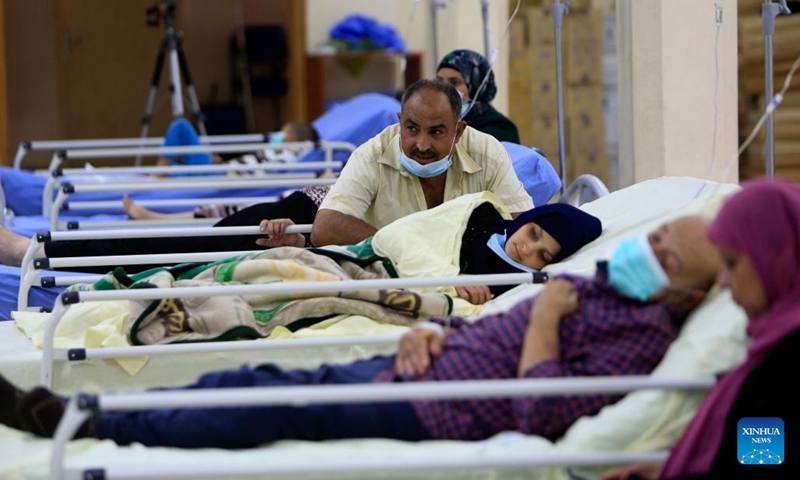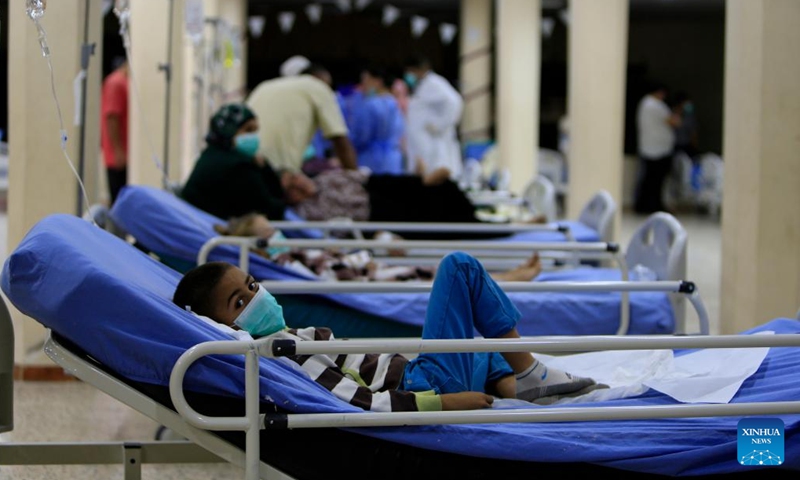
Lebanese and displaced Syrians infected with cholera are treated at a field hospital in Bibnin, Akkar, northern Lebanon, on Oct. 25, 2022. Lebanon is facing its first cholera outbreak since 1993. So far, 305 cases and 11 deaths have been reported by the Lebanese health ministry after the disease was first detected on Oct. 6.(Photo: Xinhua)

Lebanese and displaced Syrians infected with cholera are treated at a field hospital in Bibnin, Akkar, northern Lebanon, on Oct. 25, 2022. Lebanon is facing its first cholera outbreak since 1993. So far, 305 cases and 11 deaths have been reported by the Lebanese health ministry after the disease was first detected on Oct. 6.(Photo: Xinhua)
Ahmed Salma, a Syrian refugee, was moving anxiously from one room to the next at Halba Governmental Hospital in Lebanon's northern province of Akkar, where his seven children were being treated for cholera, one of whom was in critical condition.
"My children were all infected while living in the Akkar's camp of Rihaniyeh. We had no idea what was causing the rapid spread of this infection and the severe symptoms, in contrast to infected children in other camps who were not admitted to hospitals," Salma told Xinhua.
Salma expressed concern that the cholera outbreak will result in a significant number of deaths if international organizations overseeing the refuge camps do not act swiftly to support the battle against the disease.
The Halba Governmental Hospital has been struggling with mounting pressure after receiving dozens of cholera patients during the country's first cholera outbreak since 1993. So far, 305 cases and 11 deaths have been reported by the Lebanese health ministry after the disease was first detected on Oct. 6.
Health Minister Firas Abiad recently raised concerns about the fast spread of cholera in Lebanon, calling on international organizations to increase their support to contain the infection.
Abiad said 70 percent of cholera cases come from refugee camps, attributing the spread of the disease to contaminated water and close contact with infected people.
A few kilometers from the hospital, fear, anxiety, and sadness pervade the Rihaniyeh camp, where 38 displaced Syrians have been infected with cholera, with at least one death reported, according to the health ministry.
A team of doctors came to the camp, which houses about 300 displaced Syrian families, to treat the patients including 10 children.
"The doctors' reassurance is not enough to erase the fears of families living in the camp," said Khadija Othman, whose nine-year-old son was infected and isolated for treatment.
"I am worried about my son and my four other children whom I sent to another camp where my sister lives, hoping that they stay safe from the infection," Othman said. "But I heard that one cholera case was detected in the camp too, which heightened my fears ... We are no longer safe in the camps."
Othman said the situation in her camp and those nearby is terrible: untreated sewage water is flowing everywhere while clean water for drinking and washing is in short supply.
"International organizations increased the quantity of clean water after the spread of the epidemic, but this has not reassured us so far," she noted.
On Oct. 17, United Nations Children's Fund said it had developed a joint response plan, in collaboration with the World Health Organization and the Lebanese Ministry of Public Health, to prevent and contain the cholera outbreak in the country.
A total of 80,000 liters of fuel had been distributed to water pumping stations and wastewater treatment stations in locations with confirmed and suspected cholera cases, UNICEF added.
Voluntary work by individuals is also being done in some communities in Akkar, where people working for charities filled tanks with drinking water and provided soap for the displaced in the camps.
More than 1 million displaced Syrians live within Lebanon's borders, many of whom have been eking out a living for years in squalid refugee camps.
